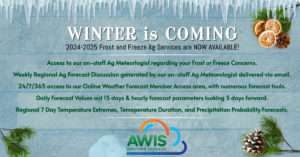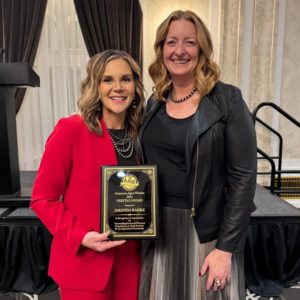Pivot Bio Launches New Retail Distribution Partnerships
 Agtech company Pivot Bio has announced a new strategic distribution partnership with Hefty Seed Company, one of the largest independent ag retailers in the U.S. with a network of 49 retail locations in 10 states.
Agtech company Pivot Bio has announced a new strategic distribution partnership with Hefty Seed Company, one of the largest independent ag retailers in the U.S. with a network of 49 retail locations in 10 states.
Beginning in 2025, PROVEN® 40, a microbial nitrogen source powered by Pivot Bio’s patented gene-edited technology, will be available at all Hefty Seed Co. locations.
In addition, Pivot Bio’s PROVEN® 40 for corn and RETURN® for sorghum, wheat and other small grains will be available to any interested farmers across the entire Hefty Seed Co. network.
To assist farmers in effectively integrating this innovative technology for maximum benefit, Pivot Bio and Hefty Seed Co. are introducing a collaborative field support initiative. This dynamic partnership will provide customers with personalized nitrogen planning, field-tested insights, and data-driven recommendations—each tailored to the specific needs of their operations—delivered by Hefty’s trusted local advisors or Pivot Bio’s expert agronomy team.
Additionally, Hefty Seed Company’s customers will have access to emerging programs like Pivot Bio’s N-OVATOR program designed to create new revenue opportunities through partnerships with downstream buyers. This approach not only supports better nitrogen use efficiency but also positions grain farmers to benefit financially from sustainable production practices.
AWIS is Ready for Winter
 Winter is upon us and that creates a special need for weather information for farmers, especially in high value crops like fruits, vegetables and nursery. To learn how the Agricultural Weather Information Service (AWIS) creates extra weather information and forecasting I spoke to Karl Harker, Vice-President for Operations for AWIS. I asked him about any information he’d like to share and what the company offers. He talks about the weather pattern that really started in the fall moving from a neutral one to a weak La Niña one.
Winter is upon us and that creates a special need for weather information for farmers, especially in high value crops like fruits, vegetables and nursery. To learn how the Agricultural Weather Information Service (AWIS) creates extra weather information and forecasting I spoke to Karl Harker, Vice-President for Operations for AWIS. I asked him about any information he’d like to share and what the company offers. He talks about the weather pattern that really started in the fall moving from a neutral one to a weak La Niña one.
We also took a look back for this year and Karl says that overall, farms had a pretty good year. However, the hurricane damage areas were hit hard. a few spots in California due to the fires and some areas that started to become more dry.
AWIS is one of the last pure ag weather information services, has been around for decades, and has expanded into other geography and industries. The need for ag weather services started when the National Weather service stopped focusing on it in 1960. Karl says there is a lot of weather information out that doesn’t have an ag background or a focus on the actual data that has to be collected and analyzed.
Find out more about AWIS and the coming winter season in our interview: Interview with Karl Harker, AWIS
Precision Ag News 12/19
Farm Groups Pleased with Relief in CR
 It was supposed to be a simple continuing resolution to keep the government operating into March of 2025, but it ballooned into a 1,547 page measure that includes several provisions for agriculture, including $10 billion in aid for struggling farmers as well as a second one-year extension of the 2018 farm bill. In addition, a provision to allow the sale of 15% ethanol blended fuel year-round and nationwide was added as another benefit to help farmers.
It was supposed to be a simple continuing resolution to keep the government operating into March of 2025, but it ballooned into a 1,547 page measure that includes several provisions for agriculture, including $10 billion in aid for struggling farmers as well as a second one-year extension of the 2018 farm bill. In addition, a provision to allow the sale of 15% ethanol blended fuel year-round and nationwide was added as another benefit to help farmers.
American Farm Bureau President Zippy Duvall thanked Congressional leaders for their response. “The high cost of supplies, low commodity prices and out-of-reach interest rates are a recipe for farm failures without help. That’s why nearly ten thousand Farm Bureau members reached out to Congress in a matter of days, to encourage them to keep working toward a better deal and not leave agriculture behind,” said Duvall. “There is no doubt in my mind that for many farmers, the critical funding in this bill could make the difference between planting a crop next year and giving up. We appreciate that members of Congress rolled up their sleeves to ensure farmers can continue to deliver the safest, most affordable and abundant food supply in the world.”
National Farmers Union (NFU) President Rob Larew urged Congress to now pass the package. “Congress has taken an important step by including billions in immediate economic and disaster assistance for family farmers and ranchers in the end-of-year government funding package. The work isn’t done. We are counting on Congressional leaders in Washington to finalize this deal,” said Larew. “Family farmers and ranchers cannot afford any more delays, and frankly, neither can the rest of the country. Congress must see this deal through. Farmers don’t get to walk away from their obligations; Congress shouldn’t either. I urge Farmers Union members to stay vocal and keep the pressure on their elected representatives to get this done.”
Congress pass the measure and send it to the president by Friday when the continuing resolution that has been funding the government at fiscal 2024 levels since FY25 began Oct. 1 expires.
Angie Craig Elected House Ag Ranking Member
 Rep. Angie Craig (D-MN) was elected Tuesday to serve as Ranking Member of the House Committee on Agriculture, replacing David Scott of Georgia.
Rep. Angie Craig (D-MN) was elected Tuesday to serve as Ranking Member of the House Committee on Agriculture, replacing David Scott of Georgia.
“I just won my D+1 district by nearly 14 points because my farmers and rural constituents know that I’ll meet them where they’re at, I’ll listen to their concerns and I’ll work with whoever I can to improve their lives,” said Craig in a statement. “My focus will be on improving people’s lives – not scoring political points. We can lower food and energy costs for consumers. We can strengthen the farm safety net and open the doors of opportunity to new and beginning farmers. And we can ensure that nutrition assistance programs are available for the Americans who need them.”
Agriculture groups were quick to praise Rep. Craig. American Farm Bureau Federation president Zippy Duvall says Rep. Craig has a long history of working in a bipartisan manner to advance the needs of America’s farmers and ranchers.
“Her leadership is needed now more than ever, as farmers face economic headwinds including inflation, high supply costs and decreasing commodity prices. Those challenges can quickly become a crisis if they’re not addressed with a new, modernized farm bill. Congress has kicked the can down the road too many times. Now is the time to act. We stand ready to work with Rep. Craig to ensure passage of a new 5-year farm bill and to address other matters important to agriculture and rural America.”
House Speaker Says CR Will Have Aid for Farmers
 During a press conference Tuesday morning, Speaker of the House Mike Johnson said the continuing resolution (CR) to be considered this week in Congress will have funding in it for struggling farmers and ranchers.
During a press conference Tuesday morning, Speaker of the House Mike Johnson said the continuing resolution (CR) to be considered this week in Congress will have funding in it for struggling farmers and ranchers.
“We can’t do all of it right now but I think what you’ll see reflected in this final package is 10 billion, to start with,” said Johnson. “So help is on the way and I’ve talked in the last 24-48 hours to a number of the leaders in the community who say they are greatly relieved by that.”
“I think this is an important step for Congress,” Johnson added. “I think the people involved understand that and it sends a signal to lenders and creditors that Congress will not abandon our food producers.”
The text of the CR had yet to be released but Johnson said he had hoped for it to be a “very simple, very clean” stop gap funding measure to get us into next year, until the hurricanes hit and they had to include a disaster package. Another addition to the CR is reported to be a provision allowing the sale of 15% ethanol fuel (E15) year-round nationwide.
Listen to Rep. Mike Johnson’s comments on the CR Tuesday morning.
House Speaker press conference 5:49Animal Ag News 12/16
American Agri-Women Honors Amanda Radke
The Veritas Award, one of AAW’s highest honors, is given to individuals who have demonstrated public witness to the “pursuit of truth.” Amanda Radke, a fifth-generation rancher from Mitchell, South Dakota, was recognized for her extraordinary commitment to advancing agriculture, rural communities, and food security. Radke, alongside her husband, Tyler, and their four children operate Radke Land & Cattle, an Angus seedstock operation. Her work exemplifies the resilience and passion of American agriculturalists.
A seasoned advocate for agriculture, Radke has spent nearly two decades traveling nationwide to defend the livelihood of farming families, promote rural business vitality, and ensure access to safe, abundant food. A former National FFA Extemporaneous Speaking Champion and National Beef Ambassador, she continues to educate and inspire through her writing, speaking, and entrepreneurial endeavors.
Amanda is also a podcast and radio show host, syndicated columnist, and children’s book author focused on fostering agricultural understanding among youth, as well as an industry consultant with CK6 and co-founder of the auction platform Bid On Beef. Before all that, she was an intern right here on AgWired while she was a senior at South Dakota State.
Congrats and well deserved, Amanda!




